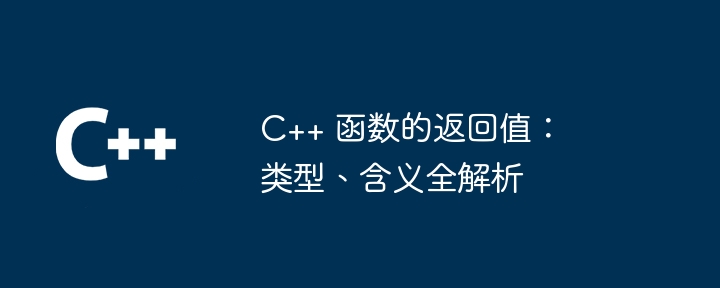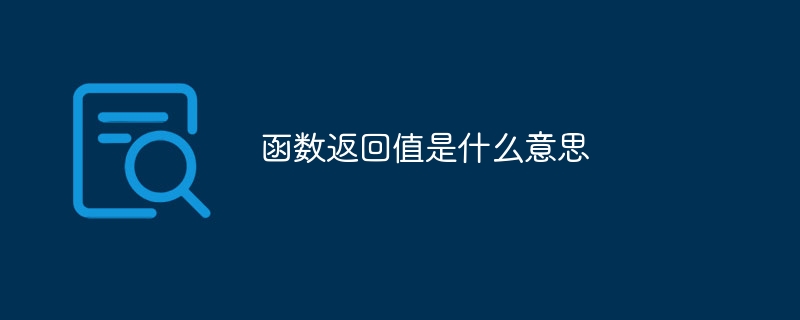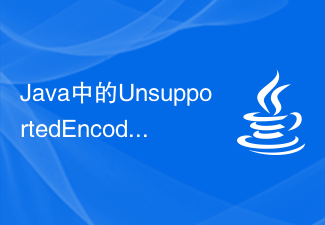The return value of a C function is undefined when an exception occurs, and the exception needs to be caught via a try-catch block and appropriate action taken: an exception is thrown only if the function cannot recover from the error. Use clear and meaningful exception types. Document exceptions that may be thrown in the function documentation. Use a try-catch block to catch exceptions and perform necessary actions.

Exception handling mechanism for C function return values
In C, functions can report error conditions by throwing exceptions. An exception is an event that interrupts the normal execution of a function and returns control to the caller. Functions can catch exceptions and take appropriate action through try-catch blocks.
Return values and exceptions
The return value of a function is usually used to represent the result of function execution. However, when an exception occurs in a function, the return value has no effect. In this case, the function's return value is undefined.
Practical case
Consider the following function, which calculates the quotient of two integers:
int divide(int numerator, int denominator) {
if (denominator == 0) {
throw std::runtime_error("除数不能为零");
}
return numerator / denominator;
}If the divide function is called If zero is passed as the denominator, the function throws a std::runtime_error exception. At this point, the function's return value is undefined.
Catch exceptions
Exceptions can be caught through the try-catch block. try blocks contain code that may throw exceptions. If an exception is thrown, execution control goes to the corresponding catch block.
try {
int result = divide(10, 0); // 会抛出异常
} catch (const std::exception& e) {
std::cerr << "异常信息:" << e.what() << std::endl;
}In the above example, the try block throws a divide-by-zero exception. catch block catches the exception and prints the exception information.
Exception types
C supports multiple exception types, including the built-in std::exception class and user-defined exception classes. Users can define their own exception classes and provide custom exception messages for them.
Best Practices
The following are best practices for handling function return value exceptions:
- Only if the function cannot recover from the error condition An exception is thrown when recovery occurs.
- Use specific and meaningful exception types.
- Record exceptions that may be thrown in the function documentation.
- Use
try-catchblocks to catch exceptions and take appropriate action.
The above is the detailed content of Exception handling mechanism for C++ function return values. For more information, please follow other related articles on the PHP Chinese website!
 Java中的NoSuchFieldError异常常见原因是什么?Jun 24, 2023 pm 09:00 PM
Java中的NoSuchFieldError异常常见原因是什么?Jun 24, 2023 pm 09:00 PMJava中的NoSuchFieldError异常常见原因是什么?Java是一种跨平台的面向对象编程语言,多用于开发企业级应用程序和移动应用程序等。在Java程序开发中,NullPointerException、IndexOutOfBoundsException、ClassCastException等异常经常会出现,而NoSuchFieldError异常也是比
 Golang 函数返回值的类型是什么?Apr 13, 2024 pm 05:42 PM
Golang 函数返回值的类型是什么?Apr 13, 2024 pm 05:42 PMGo函数可以返回多个不同类型的值,返回值类型在函数签名中指定,并通过return语句返回。例如,函数可以返回一个整数和一个字符串:funcgetDetails()(int,string)。实战中,一个计算圆面积的函数可以返回面积和一个可选错误:funccircleArea(radiusfloat64)(float64,error)。注意事项:如果函数签名未指定类型,则返回空值;建议使用显式类型声明的return语句以提高可读性。
 从零到精通:C++ 函数返回值权威解读Apr 30, 2024 am 10:24 AM
从零到精通:C++ 函数返回值权威解读Apr 30, 2024 am 10:24 AMC++函数的返回值类型指定了函数调用后的返回值类型,位于函数名后,括号前。返回值表达式是函数体中用来计算和返回函数值的表达式,通常置于return语句中。函数也可以抛出异常,需在函数声明中指定抛出的异常类型。使用函数返回值的最佳实践包括选择适当的返回值类型,清晰地指定返回值类型,设置异常类型,并使用明确的return语句。
 PHP 函数返回值的类型可以是怎么确定的?Apr 15, 2024 pm 10:51 PM
PHP 函数返回值的类型可以是怎么确定的?Apr 15, 2024 pm 10:51 PMPHP函数返回值类型的确定方法包括:1.使用typehint声明;2.根据函数定义推断;3.使用gettype()函数;4.使用第三方库(如Psalm和PHPStan)。
 golang可变参数是否可以用于函数返回值?Apr 29, 2024 am 11:33 AM
golang可变参数是否可以用于函数返回值?Apr 29, 2024 am 11:33 AM在Go语言中,可变参数不能用作函数返回值,因为函数的返回值必须是固定类型的。可变参数类型不确定,因此不能用作返回值。
 C++ 函数的返回值:类型、含义全解析Apr 30, 2024 am 10:21 AM
C++ 函数的返回值:类型、含义全解析Apr 30, 2024 am 10:21 AMC++函数的返回值类型定义了函数调用的结果,可以是基本类型(如int)或用户定义类型(如类)。返回值的含义取决于函数的目的,可以表示成功/失败、操作结果或其他信息。
 函数返回值是什么意思Sep 22, 2023 am 11:55 AM
函数返回值是什么意思Sep 22, 2023 am 11:55 AM函数返回值是指函数在执行完毕后所返回的结果。返回值可以是任何数据类型,包括整数、浮点数、字符、字符串、布尔值等。函数返回值的作用是将函数的执行结果传递给其他部分使用,可以用于进行进一步的计算、判断、输出等操作。通过将函数的计算结果返回给调用者,可以使得程序的不同部分之间实现解耦合,提高代码的可维护性和可读性。在使用函数返回值时,需要注意返回值的类型和取值范围。
 Java中的UnsupportedEncodingException异常常见原因是什么?Jun 24, 2023 pm 07:53 PM
Java中的UnsupportedEncodingException异常常见原因是什么?Jun 24, 2023 pm 07:53 PMJava中的UnsupportedEncodingException异常常见原因是什么?在Java编程中,我们经常会出现一些异常情况。其中,UnsupportedEncodingException异常是一个常见的异常,其出现的原因比较多。下面,我们将介绍在Java中常见的UnsupportedEncodingException异常的原因。1.编码格式不匹配在


Hot AI Tools

Undresser.AI Undress
AI-powered app for creating realistic nude photos

AI Clothes Remover
Online AI tool for removing clothes from photos.

Undress AI Tool
Undress images for free

Clothoff.io
AI clothes remover

AI Hentai Generator
Generate AI Hentai for free.

Hot Article

Hot Tools

ZendStudio 13.5.1 Mac
Powerful PHP integrated development environment

MinGW - Minimalist GNU for Windows
This project is in the process of being migrated to osdn.net/projects/mingw, you can continue to follow us there. MinGW: A native Windows port of the GNU Compiler Collection (GCC), freely distributable import libraries and header files for building native Windows applications; includes extensions to the MSVC runtime to support C99 functionality. All MinGW software can run on 64-bit Windows platforms.

Notepad++7.3.1
Easy-to-use and free code editor

VSCode Windows 64-bit Download
A free and powerful IDE editor launched by Microsoft

SAP NetWeaver Server Adapter for Eclipse
Integrate Eclipse with SAP NetWeaver application server.





